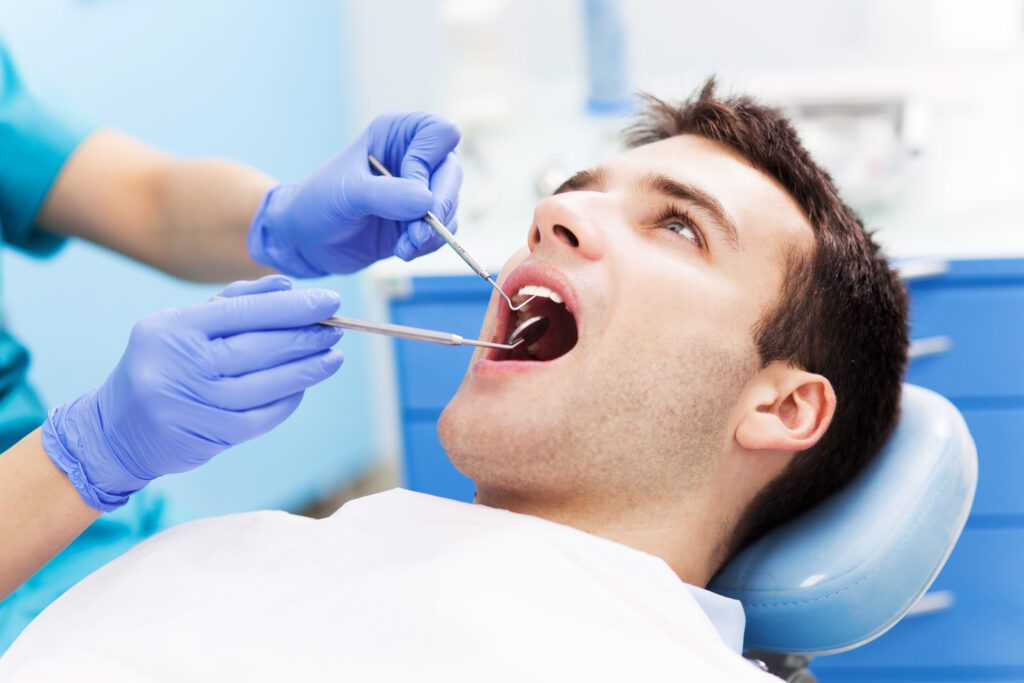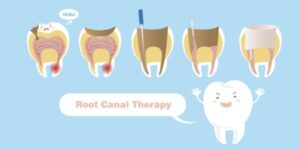When it comes to the internal makeup and structure of your teeth, nothing compares to what nature has provided you with. Over time, the dental pulp inside your teeth that provides nourishment and sensory response can become infected or damaged. This irreversible problem will usually require a root canal procedure to preserve the function of natural teeth. Dr. Vernon Sheen offers treatment for a root canal in Annapolis, MD for these patients.
A root canal serves to preserve the natural tooth to support lasting dental health. They are a conservative alternative to extracting damaged or diseased teeth. Root canals are very effective in removing tooth decay without compromising the integrity of the jaw or bite.

Is Root Canal Therapy Painful?
The phrase ‘root canal’ seems to terrify patients. The perceived pain (and cost) associated with this procedure is not as scary as most people think. Root canals are necessary when a patient is suffering from a lot of pain associated with an abscess, severe cavity, damaged teeth, or trauma.
The dental team at our Annapolis, MD dentist office takes the time to educate our patients on what to expect at every step of the process. We will also make sure you are comfortable during the treatment.
Most patients experience pain caused by the infection, not the root canal procedure itself. The truth is many patients will enjoy the pain relief after Dr. Sheen removes the infection and the tooth is cleaned and sealed. Most patients report that their root canal was no more uncomfortable than a dental filling.
Treatment for a Root Canal in Annapolis, MD


Dr. Sheen takes a conservative approach to endodontics care. When feasible, he can provide root canal therapy to relieve the pain associated with inflamed or infected dental pulp. Our dental office uses the latest technology to ensure patient comfort both during and after treatment.
The primary goal is always to save natural teeth, and each patient receives a comprehensive review of their nerve structure prior to the start of any endodontics treatment.
Dr. Sheen will begin the treatment by administering an anesthetic to numb the tooth and the surrounding area. Once the patient is comfortable and numb, he will make a small hole in the back side of the tooth. Then, the dentist will scrape away the infected pulp from the interior of the tooth. Once the tooth is clean and disinfected, they fill the tooth with an inert, biocompatible material. This will help stabilize the structure of the tooth.
In many cases, the placement of a dental crown after the root canal is recommended. This can ensure that the tooth remains strong and stable for many years to come. A dental crown will be custom designed to match the color of the adjacent teeth.
If extensive or specialized treatment is required, Dr. Sheen provides referrals to the best Endodontists and Root Canal Specialists in the Annapolis area.
Root Canal Aftercare
After your root canal, your tooth will still feel numb. During this time, you should avoid hard or crunchy foods. Eat soft foods and liquids, including pasta, mashed potatoes, and soup. Avoid smoking after your root canal, as nicotine can interfere with healing. To reduce swelling, use an ice pack on your cheek in 15-minute increments on the same side as your treated tooth. We will also prescribe you pain medication so you feel comfortable while healing.
You can brush and floss your teeth. However, be particularly gentle around the treated area. Once your treated tooth is healed, you can return to our office for a dental crown. If you have any questions after your root canal, please contact our office, and we will be glad to help you.
Root Canal FAQs
Is a crown necessary after a root canal procedure?
It depends on which tooth your dentist treats. A dental crown after a root canal provides reinforcement to your tooth. If its your molars or premolars, then you will need a tooth crown to protect the tooth. Front teeth, canines, and incisors may not need a dental crown. Although adding a dental crown is not necessary after every root canal procedure, they do help restore your tooth’s health and functionality.
Can you eat after a root canal?
Yes, 30 minutes to an hour following your root canal, you can eat. However, you should avoid hard, chewy, or crunchy foods. Eating soft foods will reduce irritation and pain surrounding your treated tooth. You may begin eating your normal diet once you receive your dental crown.
How do I know if I need a root canal?
The number one symptom to look out for is major tooth pain in a centralized area or in a specific tooth. Infections cause pain. If your tooth hurts after biting down on something, you have an infection that has reached your tooth’s root. It’s best to address tooth pain as soon as you notice it to prevent more damage and discomfort.
Can I drive myself home after a root canal?
In most cases, you can drive yourself home after your root canal. We will not use intravenous (IV) sedation during your root canal. However, if you feel groggy, dizzy, or disoriented after your treatment, you will need someone to drive you from your appointment. It’s still a good idea to bring someone to your appointment if you are unsure how you will react to anesthesia.
How long does it take to heal from a root canal?
It will take 7 to 10 days to fully heal following your root canal. Taking caution when eating, drinking, brushing, and flossing will help minimize discomfort during healing. Pain medication, ice packs, and rest will also help your tooth heal from treatment.
Will my dental insurance cover a root canal?
Yes. Many dental insurance providers cover part of the cost of this restorative dental procedure. It is unlikely that your provider does not cover at least part of root canal treatment. This treatment saves your tooth, which is best for your oral health. Most dental insurance providers consider a root canal as a major dental service and may cover the entire cost. Contact your dental insurance provider for specific details.
Schedule a Dental Exam Today
Root canal therapy can safely restore your dental health and relieve pain. It also supports your long-term dental health by preserving the natural tooth. In addition to treating root canals, we offer a range of dental services in Annapolis, Maryland. For more information or to find out if you are a candidate for endodontics treatment, contact our dentist in Annapolis, MD today. Call (443) 482-5202 or schedule an appointment online.
